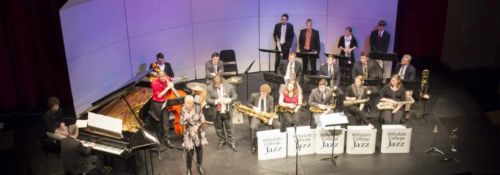
Jazz: America’s Classical Music
Written by Corinne Prost
At least once or twice a semester, the Searle Center opens its doors to a certain league of Hillsdale College musicians and their fans. The lights dim around the audience and brighten to the wails of the trumpet, saxophone, and trombone. The rhythmic section, with some piano and guitar gently rising and falling throughout, maintain the foundation of the piece. Singers may croon a song or two. On some of the livelier nights, swing dancers race their partners to the floor; other evenings, spectators remain seated, washing down the hearty performances with drinks. This is a glimpse into the jazz culture at Hillsdale College.
Jazz is America’s classical music: it would not exist without its uniquely American sociopolitical influences. This is evident in the very structure of any jazz composition, according to Chris McCourry, director of College Big Band and Jazz Combos. The methods and patterns by which jazz musicians work together as a whole—working alongside and uplifting the individual at various moments—mirrors the democratic functions of our society.
“It is so American,” McCourry explained. “When we play a jazz piece, it goes like this: you have all the members play a melody together, then people take turns giving their input as solos. After, at the end of all that, we have every member come back together to play the melody again—but it’s from a different perspective. It’s pure democracy.”
At Hillsdale College, individuals find that collaborative efforts extend beyond the common good. Jazz under McCourry affords plenty of opportunity for any student interested in music.
“I have three trumpet students right now, who had never played a trumpet before they came to college,” McCourry said. “You can do that here. You have the unique opportunity to be in the choir or play an instrument, even if you’ve never done it before.”
Jazz is the mouthpiece for its musicians, inspired by the American idea that citizens must speak for themselves if they want their voices to be heard. This parallel is what McCourry admires most about this genre.
“Jazz gives the students an opportunity to express themselves. The solos allow students to play their own self. To expose yourself like that takes a lot of guts. I’ve seen students extremely shy and quiet come out of their shells playing jazz. It’s amazing. You can’t be in this type of music and not speak up.”
This year so far, campus hit full swing with top jazz artists such as Vince DiMartino, Tony Monaco, and Mike Williams.
“The plans for the program are to be internationally recognized as having the greatest jazz program of any liberal arts college, and we’re getting close,” McCourry said.
Looking at the current success of the jazz department, it isn’t immediately apparent that building the program was a difficult, slow climb.
McCourry came to Hillsdale College in 1998 as an adjunct trumpet teacher with two students and one other faculty member—hardly enough to form a group, let alone a working ensemble. Standing together on the edge of a new century, they formed a small but determined jazz club, and McCourry embarked on his mission to make jazz an integral part of the music department.
“We started out real slow. The Big Band didn’t begin until around 2002, and in those early years I had clarinet players playing saxophone parts… One thing I realized is, getting the right faculty is important. You gotta have great players that are great teachers and also the kind of people I want students to be around.”
The year after McCourry established the Big Band, a jazz ensemble that offers credit hours to its musicians, he focused on putting together the first Jazz Combo—which eventually grew into the Hillcats, a popular faculty jazz ensemble that performs all original compositions.
For all his personal time and energy spent in building these components to the music department, McCourry emphasized that all of this growth was never possible without the students’ dedication and openness to communication.
“The students here are very smart and willing to work. With them around, I don’t see how you can fail.”
Corinne Prost, class of 2019, is an American Studies major and rhetoric minor. She dreams to one day own a library so extensive that it rivals the one from Beauty and the Beast.